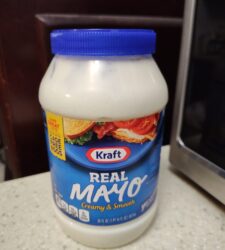Choosing the right oil means you need to know what it can bring to the table and to your healthy life.
Many options for choosing the right oil are available. Before you do, you may want to consider if you or someone you are preparing food for has an allergy to wheat, nuts, or eggs. If you have someone with a wheat or nut allergy you may want to shy away from sesame seed oil and peanut oil as a choice for the oil in your dressing. Please note that sesame seeds have been recently added to the allergy list by the FDA.
Are you looking for a healthier oil?
Choosing an oil that is pure and natural and rich in monosaturated fat, phytochemicals, and alpha-linolenic acid is best for salad dressings, for the best nutritional choices stay away from heated or chemically altered oils.
Monosaturated fats are good for your health and can help lower your LDL (bad) cholesterol levels. Cholesterol is a substance in your arteries that is soft and waxy. It can cause you to have clogged or blocked arteries and blood vessels. When you keep your cholesterol levels low you reduce your risk for heart disease and stroke. Monosaturated fats are slightly healthier than polyunsaturated fats.
Oils that you should then consider in lowering your cholesterol are canola oil, sunflower oil, and olive oil. Just remember don’t get chemically altered or heated oils. Recently, the FDA recently released a statement that will be requiring all food manufacturers to change from (PHOs), to partially hydrogenated oil. It is to be done in three years. That would make it the year 2026.
Currently, the following oils have the least saturated fat. Canola Oil has 7, Safflower Oil has 8, Flaxseed oil has 9, Sunflower oil has 12, Avocado oil has 12, Corn oil has 13 and Olive oil has 15.
What are the Benefits of Avocado oil
Avocado Oils are heart-healthy, 100% pure, and good for baking, cooking, and garnishing. My preference is the Ahuacatlan Avocado Oil as it is made from Hass avocados which is my favorite tasting avocado. The oil releases small hints of avocado flavor. This oil is a good source of monounsaturated fat and is linked to reducing LDL (bad) and increasing HDL (good) cholesterol. Avocado oil contains vitamin E and helps the body absorb other fat-soluble vitamins. So, it helps to fight diabetes and is essential for good digestion as it nourishes the lining of the gut and helps with nutrient absorption. This oil is perfect for people with digestive issues. It is great for Avocado mayonnaise.
What are the Benefits of Grapeseed oil
Grapeseed oil is also pure and derived from the seeds of grapes. It has a light flavor and doesn’t overpower other flavors. It is ideal for sauteing, frying, and baking as it can take high temperatures. The grapeseed oil provides a higher amount of polyunsaturated fats and vitamin E. This oil is excellent for everyday use. It is especially good in pasta sauces, soups, and dressings. When storing grapeseed oil, it should be stored for up to six months in a cool, dark place or in the refrigerator. The cost of grapeseed oil is less than olive oil. I use this a lot because Grapeseed is known as nature’s sinus medicine. Having an egg allergy, myself, I am a firm believer in the sinus-fighting properties of grapeseed. You can also buy it as a supplement at the vitamin store as a natural sinus medication that helps you and it is non-drowsy. There are other benefits of grapeseed too. It is antioxidant and anti-inflammatory and may help to keep your sinuses from having inflammation. Grapeseed oil helps to prevent chronic conditions such as cancer, heart disease, diabetes, gastrointestinal conditions, and Alzheimer’s disease. Another perk for grapeseed oil is it is less expensive than Olive Oil. For people with egg allergies, it is a great oil to use for salad dressing or making homemade mayonnaise.
What are the benefits of Olive Oil
It is all-natural and has a rich earthy taste. Olive oil is perfect for salad dressings, marinades, and bread dipping. It doesn’t have a high heat point like grapeseed oil. The ancient Greeks referred to Olive oil as an “elixir of youth and health”. (An article is found in the Journal of the American College of Cardiology Volume 79 issue 2 from January 18, 2022.) Researchers concluded that a higher olive oil intake lowered the risk of total cause-specific mortality. Thus, replacing margarine, butter, mayonnaise, and dairy fat with olive oil is associated will help to lower the risk of heart disease. Studies have shown that only half of a tablespoon of olive oil a day may be all that is needed.
Olive oil has an anti-inflammatory agent that fights the specific inflammation that is the main cause of diabetes. It easily incorporates flavors of spices into it. Set aside a bottle and put some basil and oregano, minced garlic, and marjoram in it the night before you want to use it. It is great in a marinade for meat and excellent for making Italian dressing. Olive oil improves brain function and protects the brain from free radical damage. That makes Olive oil a good component to fight Alzheimer’s disease. And atherosclerosis. It is high in essential brain vitamins such as vitamins “E” and “K”.
Eating foods rich in monounsaturated fatty acids like extra virgin olive oil and coconut oil can help reduce belly fat storage. The Mediterranean diet had some recipes that can help with this. Coconut oil is another oil that helps with weight loss. It is the best at boosting fat loss as it stimulates metabolism and suppresses the appetite. Both help fight diabetes. It is very tasty with fresh spinach or salads. Just drizzle a little olive oil over spinach, tomatoes, kalamata, olives, and feta cheese and you will have a nice lunch or dinner salad
There are other oils that can be used but these are my favorites.


